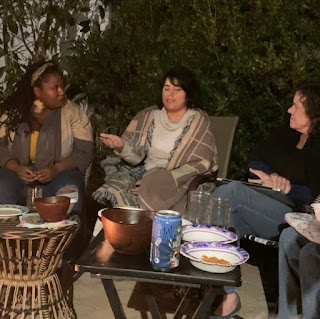In the shadow of the nationwide Operation Rescue protests that threatened abortion clinics here and elsewhere we staged a feminist production of The Taming of the Shrew.
I know. Anyway.
The company was about to embark on our second season of late night political short plays, which involved not only moving to a new location up the street, but also renegotiating the commitment of our company members.
A few of our original members had gone, others chose this moment to depart. One person in particular, we sat down to discuss elements of production and just exactly how we decided what pieces would be in and which would not.
This guy asked, “What if I wrote a pro-life play? Would that be voted on?”
We said no. Our company, the company we founded, would never allow a message that stands against a woman’s right to reproductive choice to be expressed on our stage.
The guy said, “That answers my question.” And we all shook hands and he left the company.
Later that year I would write a play called, RU-486? Yes, I am! about the abortifacient which would later be known as mifepristone. The national debate was whether or not such a drug may legally be administered and I wrote a monologue for a woman who was grateful that it was now available for others even as it arrived too late for her.
I created those words for a person with a uterus to read. On this subject, however, I think it is time to listen. I have written a new play, for which I have not created a single word. They were all spoken by women, and I wrote them down.
Sunday night we had a reading around a fire bowl in the backyard of that same house I bought twenty-nine years ago. Fourteen different voices (this time) shared the piece which we are currently calling After Roe.
Our discussion afterward was very promising. They liked “hearing from women who are on the periphery” and that it goes to show that every abortion is a case-by-case situation, just like everything else in life.
As I was editing the piece I “braided” the dialogue (braided, that’s my new word this semester) so that there was a flow to the piece which involved common themes and events. Most agreed they wanted more of that, for longer passages to be broken up even more, that the strongest moments were when women appeared to be responding to each other, even as the source material consists of individual interviews.
Comparisons were made to The Exonerated, Fefu & Her Friends and the Punchdrunk production of The Burnt City. When the discussion came to staging I said I’d like to see a nice living room, and that each “character” has a drink and stands (or, who knows, sits) to tell their story – which invited a comparison to the first scene of Top Girls. Extra points for a Churchill reference!
We had taken a break around the forty-five minute mark (the reading was 75 minutes) to set and light a fire. While I was getting things together, the readers were all actively talking and laughing. In spite of the relative brevity of the piece, I’m thinking having a break at that point, when things are just ramping up, might be a very effective way to spur discussion.
That’s what we call an intermission, but still.
During the second season of Guerrilla Theater, one of our members wrote a wistful piece about lost potential. It was a monologue written from the point of view of, I don’t know. A soul? A potential life which was unrealized due to an abortion.
The playwright Wendy McLeod wrote a full-length play called The Water Children that included a similar premise. A woman who had an abortion is haunted by a potential son she did not have, named Chance.
I know. Anyway.
However, MacLeod was addressing the thoughts that women do have when they choose abortion. And she is a woman. It is apparent that Chance represents feelings of doubt or regret, and not an actual spirit.
I pointed out to our playwright, who was a man, that his monologue, as thoughtfully written as it was, was a pro-life argument. It gives agency to an embryo, complex thought, self-determination. He said he hadn’t seen it that way, that he just was trying to look at the argument from a different perspective. I said I wouldn’t permit it. The piece was withdrawn from consideration.
There was a lot of active listening to After Roe Sunday night, as so many stories and details were being thrown about by the legal and medical experts, and individuals who were sharing their stories.
“At times I was confused, but also excited to be informed.”One very important question regarded what happens after the play has concluded. “What do we do with this?” Having a post-show talk seemed inadequate. What would be provided, in the form of contact, right there in the theater, following a potential reading? “You want to become an activist, a doula, a counselor? Here’s how.”
“This information is not something we are taught.”
“We do all know this, saying it out loud is the new part.”
The piece is still rough, there were details I missed, some stories can be tightened, others need to be expanded. And there is one more interview I need to conduct, and I am looking forward to that.


No comments:
Post a Comment